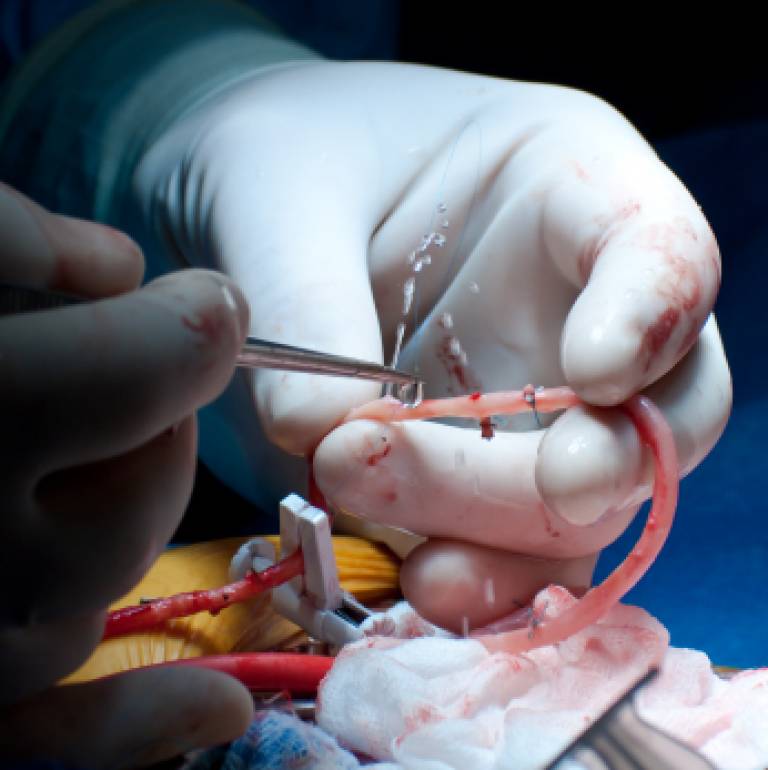UCL team wins £500,000 grant to develop synthetic artery
11 August 2009
Links:
 ucl.ac.uk/surgicalscience/" target="_self">UCL Surgery and Interventional Science
ucl.ac.uk/surgicalscience/" target="_self">UCL Surgery and Interventional Science
A team of researchers from UCL has won a £500,000 grant to develop a synthetic artery that mimics a natural artery - and could revolutionise the treatment of coronary heart disease.
Professor Alexander Seifalian (UCL Surgery and Interventional Science) and Professor George Hamilton (UCL Surgery and Interventional Science & Royal Free Hospital) and their team will use the Wellcome Trust grant to take their work from the laboratory to a pre-clinical trial.
The team has been developing a new nanomaterial with mechanical properties similar to that of human arteries.
The nanomaterial's inner surface has been modified to attract stem cells from blood circulating inside the body.
It converts these primary cells to endothelial cells, a type of cell that covers the interior of the natural blood vessel and protects it from blockage.
The breakthrough offers hope for sufferers of heart disease who are unable to donate suitable substitute blood vessels for bypass surgery.
Professors Seifalian and Hamilton, experts in nanotechnology, regenerative medicine and vascular surgery, explained: "Coronary heart disease is a condition where one or more blood vessels of the heart become narrowed or blocked. This causes the heart muscle to be starved of oxygen causing damage often leading to a heart attack and muscle death. This interferes with the heart's ability to pump blood around the body, leading to infirmity and possibly death.
"The current treatment of the disease is to create a new route for blood to circulate, most often by balloon dilatation and stent (stent angioplasty). In many patients however this intervention cannot be performed and in this situation an operation called bypass surgery is needed which can either use substitute blood vessels from another part of the patient or made from a plastic material.
"Unfortunately, up to 30% of patients cannot supply their own vessels and the plastic vessels currently available are not suitable for the small diameter vessels in the heart; because of this most surgeons will not use them. The prognosis for the patient under these circumstances is at best a reduced quality of life.
"We have developed an alternative using a new nanocomposite polymer with similar mechanical properties to that of human arteries. The result for the patient will be a synthetic vessel which we believe will function as well as the patient's own blood vessels - allowing surgeons to successfully operate on patients who cannot donate their own blood vessels."
If the nanomaterial performs as well as or better than a natural vessel, it could be used for all patients, removing the need for harvesting the patient's own blood vessels and reducing the length and complication rate of bypass surgery. There would also be advantages in treatment of arterial disease elsewhere in the body where stent angioplasty or bypass surgery is needed.
Professors Seifalian and Hamilton and their group are working closely with UCL Business (UCLB), who are providing vital regulatory support to ensure pre-clinical milestones are reached smoothly and the route to clinical trials is as efficient as possible. UCLB is also identifying industry partners to commercialise the technology.
UCLB Executive Director Anne Lane said: "The UCLB business managers and project management team have accelerated the time to market for Professor Seifalian's polymer. Our unique approach most importantly allows the benefits of the product to reach patients more quickly while significantly increasing revenues to UCL."
Depending on the success of the preclinical trial, the team aim to take their work to clinical trial in early 2011.
Image: preparing a vein graft for coronary artery bypass surgery.
UCL context
UCL Surgery and Interventional Science is one of the most prestigious medical schools in Europe, with a team of nearly 400 people, from surgeons and oncologists to clinical trials specialists and researchers. It spans four London campuses (Royal Free, Bloomsbury, Whittington, and Stanmore) and brings together three major research departments - Surgical Research, Urology, and the Institute of Orthopedics and Musculoskeletal Science. Within these departments are world-class research centres specialising in tissue repair, oncology, biomedical engineering, laser medicine, anaesthetics and more.
UCL Business PLC is the organisation responsible for commercialising research across all disciplines generated from within UCL and associated organisations. It is primarily responsible for protecting inventions and transacting commercial activity including options, licences and collaborative commercial research. UCLB also has responsibility for creating and spinning-out companies from UCL. UCLB is wholly-owned by UCL and operates as an independent company with its own Board of Directors.
Related stories:
UCL offers cutting-edge MSc in Nanotechnology and Regenerative Medicine
£5million for nanotechnology healthcare research
 Close
Close

